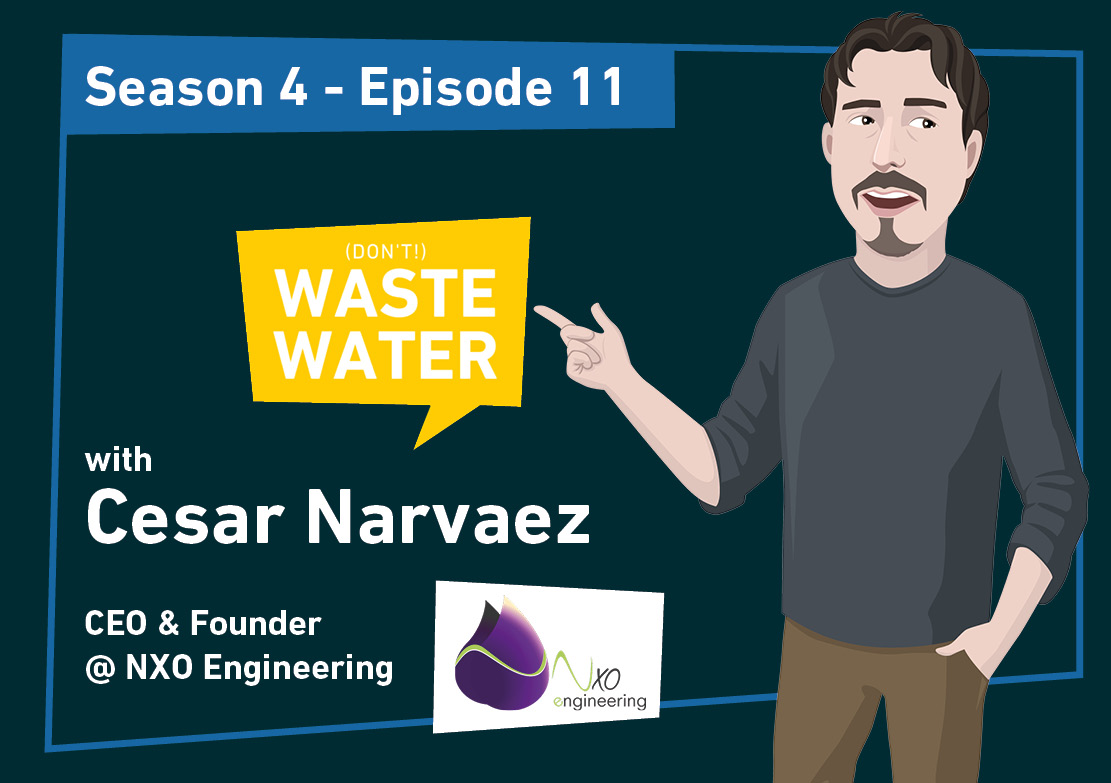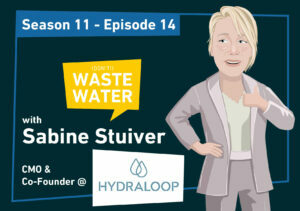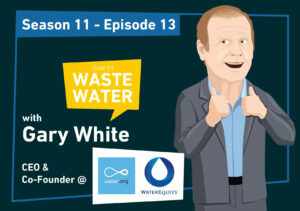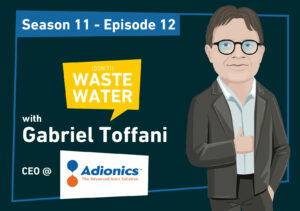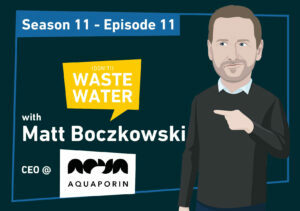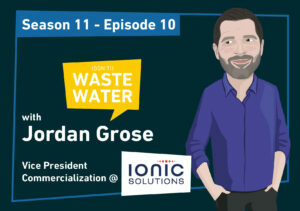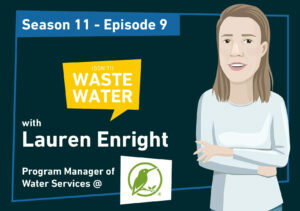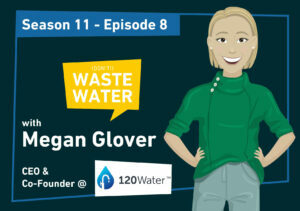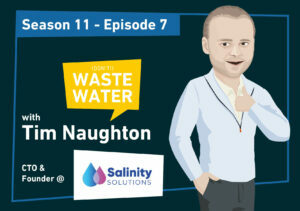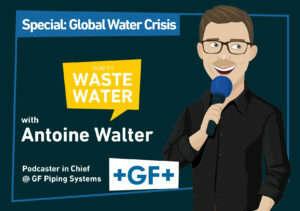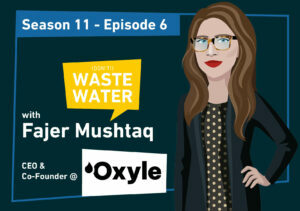with 🎙️ Cesar Narvaez, CEO & Founder of NXO Engineering
💧 NXO Engineering is a deep tech startup in the Water and Sanitation industry developing a new generation of wastewater treatment plants.
What we covered:
🌱 How Green Algae might not be your enemy, despite years of Activated Sludge bulking
🍏 How it might be about time to challenge the status quo in Wastewater Treatment
🌱 How beyond CAPEX considerations, looking at energy consumptions, OPEX and carbon emissions shall be the future of the Water Industry
🧮 How NXO managed to run a successful proof of concept against all odds and market standards
🍏 How leveraging green algae may turn eutrophication into a positive concept
🍏 How decision-makers are ready to shift their Key Performance Indicators to global impact
🌱 How the next step will be to turn the process totally chemical-free by leveraging cacti slime
🍏 How NXO managed to successfully downsize equipment and processes
🧮 How they turn out to build an EPC (almost) from scratch, and how challenging that may be
🏭 How the concept might be adapted for industrial applications and the company’s overall outlook for growth
🍏 Green Algae as deep tech, getting support from the largest french research institutes but also getting their pilot plant degraded 8 (!) times, grit, passion… and much more!
🔥 … and of course, we concluded with the 𝙧𝙖𝙥𝙞𝙙 𝙛𝙞𝙧𝙚 𝙦𝙪𝙚𝙨𝙩𝙞𝙤𝙣𝙨 🔥
Teaser: Green Algae Treatment
Resources:
🔗 Have a look at NXO Engineering’s website
🔗 Come say hi to Cesar on Linkedin
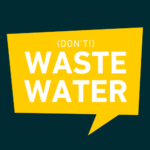
is on Linkedin ➡️
Infographic: Green Algae Treatment
Infographic-Cesar-Narvaez-NXO-Engineering-Fighting-Green-AlgaeQuotes: Green Algae Treatment
Cesar-Narvaez-Fighting-Green-Algae-NXO-EngineeringFull Transcript:
These are computer-generated, so expect some typos 🙂
Antoine Walter: Hi Cesar! Welcome to the show.
Cesar Narvaez: Hi, my pleasure.
Antoine Walter: I’m incredibly happy to have you because I’ve discovered you at. Where you were giving a conference, it was a bit provoking to a certain extent. We’ll come back to that later. And also you are fostering something which most people try to get rid of. So I loved how you are retaking that if everybody zigs you zag, I think you were applying that, but that’s for our deep dive.
So just before we go to that, let’s start with our good old tradition, which is the Bosco. And you’re sending me a postcard from monopoly. What can you tell me about which I would ignore by now?
Cesar Narvaez: Well, I’m pretty a pretty nice city, pretty nice city. What I love from MBAs that dynamics eight out of the students, eight of young people, many, many young people trying to make an impact.
It’s like berries, but a little bit more conservative in some cases, because there’s a kind of population it’s a little bit old because you know, when retreating people go to the sea, so it was like a very nice somebody else’s I enjoyed the place, actually. I’m going to be honest with you. When I came to France, I came here for the first Simon he’s in now 10 years.
So I’m not going out.
Antoine Walter: I would really like to see you go to the street in Mobilia and telling them it’s like Paris, but with something more, because monopoly a Paris, it sounds like, you know, they have the sun, they have the sea and you compare them to Paris. I’m not sure
Cesar Narvaez: were like, because of, they didn’t have some, you know, the dynamics then they not.
Yeah.
Antoine Walter: I was preparing for our discussion and was reading a bit what you were writing left and right. Listen, some interviews. And I, in that you, you said that you’ve been always interested in the water energy nexus and your, I always want to see when people start to get interested in something you say always.
So now I imagine you as a small child walking around and saying, I’m interested in the water energy nexus, maybe that wasn’t as early as that. So when did you first get interested in that’s full.
Cesar Narvaez: Very good question. Actually, I was always interested in water since Katy, because when I was a kid, I, I lived in a place where we just had access to water, like 2 hours per day.
So you got out, you know, the logistics, you got to prepare it in your house with buffer tanks and everything so that you can accumulate water for the 24 hours uses. And you only have the access pump on for any two episodes. And it was always interested in water. Let me see how that’s not possible, how this is going to be.
This is not possible to leave like this. You know, we have already enough responsivity as in our lives. So we take care also of how we use water. How would we get it? I mean,
Antoine Walter: You’ve grown up in Peru,
Cesar Narvaez: right? Yeah. Yeah. I’m Peruvian. And my curiosity in water, it started like in a very, very young age, but when I created a company, because I just wanted to get involved in the water sector for many reasons, but we can dive in later, I realized that you can not.
Create a profitable thing, knowledge or resource, if you don’t take into account energy. And then I started to think about what an energy and you know, when you, when do you want to use water that water, for example, or treated water, you need energy and the more energy you use. To treat it the less chances of profitability in this matter.
And the opposite self is the same because when you need energy, we want a way of producing energy is used and see which you use that chemical illustrating the mango CD with an Arabic reactors to produce it, to transform CRD into method via this energy. Also, you can use from Waterfield. To generate, you know, electricity with a turbine hydrotic tracing, you can also even transform water H2O into hydrogen and oxygen electrolyzers.
So there’s always deeply connections between these two resources and I always use. Well, like 12 years ago, I said, if I want to make an Impact in the water industry sector, I got to understand the energy sector before, but that was a whole thing about this nexus. And I know that now the difference are some research is working on that area.
So they are making, making them, you know, deep studies about, which is the best way to create a most energy efficient .
Antoine Walter: There are many aspects of that nexus because you know, the, the energy sector is said to be the water sector with 10 to 15 years advance. So you can see the future. If you look at the energy market, which is true, for instance, for the decentralized treatment, the distributed treatments, which is a bit the micro grid you see in the energy world, but you’re also addressing it from another angle, which is to say, actually water is a kind of liquid energy.
So you have to look at that. You said you wanted to be working in the water sector. So that was even before.
Cesar Narvaez: Yeah, because actually when I was a key that I didn’t know precisely, but I was always involved with water technologies. So my background is fishing engineering. So what I get passionate about, uh, agriculture, you know, and we’re not aquaculture aquaculture sector, it’s actually a somebody else’s between see which statement and techniques.
So you need to treat the word biologic again, physically. Yes. One environment, the correct environment for growing something, shelter, retreats, whatever. So I would, I always really dated around it. And then I realized when I read getting to that, it was not a culture, actually. It was only water. And then I discovered my garage and everything like that.
So maybe, but it’s.
Antoine Walter: So that makes for a smooth transition. I’m taking aquaculture and I’m putting it in the fridge because I guess that’s going to come back into conversation at some point, but you’ve mentioned Algea and that’s a bit what I was teasing when it was saying everybody wants to get rid of LGM.
And one of my first wastewater project, which I can recall when it was a young engineer and there wasn’t a wastewater treatment plant and they had a big growth of this green algae and they were really desperately trying to get rid of it. You do the exact opposite? You’re saying no, there’s a lot of power inside.
So when did you first discover there would be something to do about Algea? What was your.
Cesar Narvaez: The trigger was when I was working in a lab producing micro-algae to feed the shellfish and fish. So we needed to produce this biomass because biomass and for producing it, we have to feed the reactors to bio-reactors with nitrogen phosphorus, even CO2 and well, that’s the way of doing it.
So there, because we need to preserve an extended care environment. So everything has to be chemically controlled and everything. And then you’re working with, we would say, which I realized is electrification. I immediately connected to both of them. It’s an impossible to use these like a way of treating water because algae consumes nitrogen and phosphorous, and I have to give it, give it to them permanently so it can produce biomass for fish.
So that curiosity just started there. And then I worked like for a year and a half with the Spanish colleagues that they were willing really though. Serious drug was though this technology because they have, you know, a better configuration. I, it to run a ghoster more, more light, more higher temperature. And I worked with them like a year.
And then I validated that this process had sounds, you know, it had sense and yeah, they work with this technology, but. Going to various station, but then I confirm it, sorry. So I said, okay, perfect. It is viable. And now we have to start looking at the ways of controlling this environment because what we do here actually is, we try to produce eutrophication devices controlled so that we can treat nitrogen and phosphorus.
And at the same time treat chemical oxygen demand (COD). Because it’s an excellent way of producing oxygen for free.. You know, photosynthesis, there is nothing new about it. However, we in the classic processes like activated sludge others that I get that I get, I, I have nothing, you know, it doesn’t bother me yet, but it’s like you said, technology like others, but it’s very energetic.
It’s very energetic. And once you say energy to, you have also think about CO2 emissions. You know, there are some locations where you don’t have the choice, you have to pass and use activity sledge. It’s the only way. And I get it. However, they’re all supposed to be what it is. And this one is only one. And eh, there has been doing some studies before, but it didn’t go far.
So now we are joining to go far with
Antoine Walter: this new. That’s something I like to understand, because when you think of it, a wastewater treatment plant, it’s water polluted, who comes in a plant and that plant is removing C, N and P and then at the outlet it’s water, which is really good shape, which you can put back to the river or whatever, but it’s really all about capturing the CNP.
And as you said, the green Algae is really something which is capturing CNP. So why does it need NXO in 2021 to come with that and why isn’t it so obvious to everyone to use Algae?
Cesar Narvaez: Yeah. Great question. Great question. Because before there was other, other complications, you know, because she has a problem, it’s not a problem.
If you didn’t have to go to approach it is a problem. It’s yeah, it’s a challenge. Algae is very difficult to remove from water. And you need an energy efficient technology to extract it with the least energy amount possible. So at the time it wasn’t, we didn’t exist or it existed, but it was the one developed and one of our core activities is developing DAF – Dissolves Air Flotation technologies we use DAF to remove algae from water in a very efficient way. That’s why now it makes sense to associate Algae reactors photobiological reactors or algea ponds, with flotation reactors.
Antoine Walter: You said it right here. I know I was teasing you a bit with this element of you are against activities flush. I do know you’re not against activated sludge your presentation and politic was pointing out the fact that it was invented in 1914 and that we still rely on it.
And that substance too, it’s something we’ve been talking about on this microphone, but there’s also, you know, there was a famous study. I can’t remember now from the top of my head, if a funding back, I put it in there, the episode note, but it was a famous study in the sixties. Published in one of the most well-known scientific journal about the evolution of the efficiency of activated sludge.
And the paper was five lines long just to say, um, no evolution. It wasn’t really very good. It’s still very good. That’s it? It was a bit to mock all these people who were investing millions in developing the process, but the workhorse was still here. And somehow, do you think you have a chance somewhere down the line?
To disrupt a process, which is thirst obvious, then activated sludge.
Cesar Narvaez: I think every CD, because we’re talking about wastewater treatment plants and a week when we took a lot of waste water treatment, once we took it away. Because we don’t install these for houses, at least for first city and every seat has its own limitations and constraints and challenges.
So I think there is a technology for a situation. Sometimes there are there existing knowledges that are global and then can be easily adapted. Activated sludge is one of them for short that’s when you want to aim to the rationalization of resources and why is every. Activated sludge is not always with the best solutions because of what it was said today, people are more and more concerned about CO2 emissions are more and more concerned about energy rationalization and the activity.
Well, it has this contract. It’s going to be pretty curious, but you’re going to realize that you’re going to have to produce to it to me. You shouldn’t send, it spent electricity and you know that now I know. Well, I think you know that because I, at least it’s a little bit to your post guests and the great job you’re doing actually great of informing people about this cetera.
And you know, when there’s that none rationalization activity treating water, do you know who pays the bills? It’s not Veolia or SUEZ is not that the company that, you know, that exploits, that was where it should have been done. It’s not the city, it’s the citizen because the citizen is going to bait that bottle of water and the cost of a water in the city is composed of three factors.
40% is the price of producing and transporting that water 20% is taxes. And the other 40% is that cost of treating. So if your activity of trying to see which it’s not profitable, it’s not, I don’t know, rationalized, it’s not those actors two and a bit of consequences. It’s the city. It’s a citizen.
Antoine Walter: There would be a lot to unpack here, but I don’t want to sidetrack you in a discussion about the price of water regarding this element of the carbon emissions that I’ve read on your websites.
That’s waste water treatment plants and treating wastewater in, in French represents one persons of the carbon emissions. If we zoom out the full water industry, depending on the study is about five to 10 persons of the words emissions. A big part of it being of course the bums and everything we have in the networks.
But nevertheless, I mean, it’s sounds sometimes like a dead spot from the zero carbon movement. We are four times more impactful than the planes. And when you say zero carbon and people say, Hey, you stop flying. They don’t say, I don’t want to open my tap or to flush my toilets. At some point, they’re going to come for us and they’re going to say, Hey you, by the way, you also have to be zero carbon, like everyone else.
And at that point in time, we have to go for solutions to reduce the carbon. My question is, did you. See that already coming in the discussion, like you’re discussing with the city you’re discussing with a big major and they tell you, oh, by the way, we have to take care of carbon. Yeah, for
Cesar Narvaez: sure. That’s going to get here like very quickly.
Last month we were in a meeting. It’s not voted tickets to sit on the mat. This is the place where all the majors, you know, go to find solutions for the city. I’m going to be honest with you. The RNC postings argument. They don’t care for me. It’s carving now I want my city to be carbon neutral. How did I get there?
So the fact that with our technology, we are not releasing CO2, by the way, are capturing CO2. It’s way more interesting for them, way more interested in the, under the initiative, because you know, we’re addressing. We don’t spend enough energy. That’s why we can, like, we can accomplish this objective for energy positive because you know, microalgae produces oxygen that bacteria uses to treat the chemical oxygen demand.
So in our pretty precision, we have only have five. It’s like three to four kilowatts, not more so we can get the , but for them it’s so small. And yet the amount of injury that they, they have to pay for that they say no energy. It doesn’t matter because the optics is going to be very low. However, the carbon objective that interested in it, because we have a NOAA that they collect claim, medic plan, wherever we are more concerned, actually.
So yeah. Yeah, for sure. And this is not going to come out like in five-year it is now it’s happening. Let’s
Antoine Walter: talk a bit about your algae. You present yourself as a deep tech. When I read that, I think this algae must have like particles inside or something really special about it, how wrong.
Cesar Narvaez: Well, no, there’s none of my commander Barstow’s yes, sure.
You for now, but you know, when you say deep tech, many people related directly to applications and formatic and numerical activities, but, well, they actually, the actual definition for deep that is a deck that is. And we are Cleantech actually, where I couldn’t take, but if we are just reactive, we’re doing something against the flow that you said at the beginning.
And yeah, we work, however, in ways of how we can make, create some biotic interactions with an IgM bacteria. So that work processes are more and more efficient, like I said, or more and more energetic or more and more performance into. Yeah, that we’re working on that. Yeah, but no, we don’t have no particles inside.
Antoine Walter: Aside from the jokes that are on nanoparticles, when I’m saying green algae, you know, what you see is those algae, which really are a sign that your river is in a bad shape or that your ocean is in a bad shape. Is it the same algae that you are leveraging?
Cesar Narvaez: No, which actually, one of the questions that people have is, is this reactor really robust.
Isn’t going to be able to handle, you know, Temperature variations, you know, different flows between the day in the night and okay. This kind of delicate stuff. And I say always, when you have an eutrophication problem in the river really was something, you said simple to you to eradicate it. Now that’s the same here.
We’re trying to promote to foster this drawing in a controlled environment, for sure. And know it’s as robust we are today in India. Well December, but for me and my team, my head is it’s already in January. And we had like minus seven degrees. It was wearing, of course the metabolism it’s it’s reduced, but it, for sure what tuning water, the might’ve has reduced, but which you can water because the input is between 12 and 25 degrees.
And it enables you to have a reactor between five and 10 degrees solvers. So yeah, it is.
Antoine Walter: So the energy is part of your special SUSE and there’s the dissolved air flotation
Cesar Narvaez: reactors.
Antoine Walter: Yeah. So what is special about your reactor? Well,
Cesar Narvaez: actually for the DAF, so the Dissolved Air Flotation, there is nothing special and we have that configuration that is that it’s a little bit new, it’s more vertical.
Then they already sound on that we know, or that you can see normally. But there’s nothing special about it. The set configurations geometrical is already cuffed. We’ve consumed metal of energy. We have spent some time automating in a way that it doesn’t, you know, gives you trouble when it’s working. The only problem I for this directory is that we need chemical products.
Sometimes blamers does. The dark side of this solution. Well, actually in every waste water treatment plant, you have chemical products, but then the only dark point of our procedure is that we need to destabilize my projects. Certainly we can extract them by flotation. And that’s why we work in other areas like producing by projects.
Yeah. But what we’re trying to do is actually we want to really conceive and design a serious process that our theory.
Antoine Walter: So this bio coagulant is that’s this cactus lime, which I’ve seen on your, on your website,
Cesar Narvaez: we’re working
Antoine Walter: at the cactus in your thing. A, that thing is going to disrupt the collagen and I’m usually getting from a chemical factory.
Cesar Narvaez: Well, it wasn’t exactly that, but at the beginning, yeah, we just wanted to find solutions for destabilizing. Which origin it was beer, you know, which wasn’t clinically. And we actually studied some there, some possibilities. We started with Miranda, which started with two ketosis. But when I see that product on the cactus, I find it very bright missing because it’s completely transparent.
It has a Realogy Realogy compartment then that you say, well, something there. And then we test it and for sure, it’s promising and we have already stipulated in microbes. You’re doing it. The problem now is the we’re trying to make, you know, and then just strong way of producing constantly, because for now we’re just doing it.
You only like the proof of concept. Now it’s wearing the face of how are we going to make it industrial? How are we going to use this? Buy your product available for men, for activities, for many cities, for water treatment in private companies that would like to use it. We’re in that phase. Now,
Antoine Walter: let me ask you a dirty question.
Why do you bother developing a biochemical? You’re a startup. The thing which is disruptive about your process is the green algae. You could just be saying what I’m doing is already much better than the existing. Okay. I might be using some chemicals, but who doesn’t in that industry anyways,
Cesar Narvaez: because I had some returns, but many people says men about money.
People have the sector says, yeah, you’re doing a lot of things different. So trying to focus on that, but when there’s something that still backs me, when I know there’s, there’s one critic bossy ball, because yeah. It’s the guy who tries to treat a water weed ad you buy it, you know, in a very biological way and everything, but he used the products.
So yeah, in, in every way, ways what it for tonight, you have to give him good products, but you’re not, but there’s something, you know, there’s something that starts. Where you’re creating these new approaches that is completely logical and racial money, an energy. So, so it bothers the district any time they asked me this and that’s why we’re going to get it.
When I get to that place where we’re going to be able to say, yeah, this is Kim, we got free. This is CO2 negative. This is energy positive. And he says, and there’s no one argument around, so, well, we’ll get there way. I think I’m going to be able to sleep through it. Okay.
Antoine Walter: So once you’ve separated your algae from the water in your death with a bio coagulans, but you you’ve separated it.
What do you do with it? Ah,
Cesar Narvaez: What we do is that we utilize anaerobic digesters? So that was another different story because at the beginning of when we said that we wanted to conceive and I drove it digesters in a very small scale, you know, everyone dealt us in front of. Mainly the at demo, you know, D I dunno how to say it in English, but yeah.
Then is the, the organization that pushing the energy, the energy administration, and they don’t seem to start. It’s not possible for a hundred person, a waste water treatment plant for a hundred percent of value. It’s not profitable and we proved them wrong. You say it’s profitable. It is profitable. And they spot.
Everyone wants to know is that Buster them even do it don’t even butter in and within. So, you know what? I don’t the way we have to reinvent a lot of processes to make it profitable, to make it, to make it work. So to be honest with you, we started with a more difficult, because we started with a very, very small wastewater treatment plant.
When you have a big one, you know, there are a scale of foundations. There is, there is an, a scale economics that is going to even make more profitable. This is what I was drinking water.
Antoine Walter: So what’s special about your anaerobic digester so that you, you can be cash positive at 100 population equivalent.
When my old engineering books tell me from what I remember, that the scale at which it starts to be interesting is 30,000 population equivalent
Cesar Narvaez: because we have stablish the positions of the equipment. So we can limit the cost of ethics material. The ethics material is what makes very difficult to have a return on investment.
It goes to like four times the price of a bump bump and a bump ethics. It’s like four times more. So when your gap is higher, obviously your return on investments is, is higher. And then they say, no, it’s not, it’s not relevant. It’s not profit. So what do we do is we have assembled differently the processes one first one, so we can limited the addicts material.
First one second. One, we have redesign of way away of stuck in biogas. I don’t know if you’ve seen in the waste water treatment. Blessed. Jonathan X that are being used to start by. I guess that giant eggs are tree are two layer, plastic membranes. That first one contains the value. The second one contains there to protect the biogas membrane.
So you need, what do you need? You need a blower. This is not an electrical water more. So what do we do is okay, we’re gonna have to bring that would’ve been a theater and you gave. Device that is going to be able to stoke by, I guess, without using energy. We did that to us. And then the other way is that I told him, yeah, if you have a term of freedom digester for shortly that I need energy and even, and, and energy input and carry input.
When in the middle adrenaline goes, we have an advantage. We have, uh, eight out of, you know, sunlight. And when. Design that your building or your installation without an unequal climate principle, like perfectly south all the time. Very well insulated black so that it can have, they’re making her see that you can get sacrificing digester, meaning ambient temperature working and producing by, I guess.
So we have to reconceived this way before. You know, producing mightiness or transforming chemical or sentimental .
Antoine Walter: It’s interesting because when I first looked into your company, I thought you’re a process company dedicating to this algae and it turns out what I’m listening. Now. It’s a bit more like if you’re building an EPC, because basically that’s what it is that the definition of an EPC is the one able to build the turnkey plant with all the stages.
And if you’re doing the process with a green algae or you’re doing the separation between the LG and the water, you’re working on the waste side of it, because you have this anaerobic digester. You really have all the elements. So is that your vision to building the plant? Yeah, for
Cesar Narvaez: sure. We had no choice.
We had no choice because at the beginning we were just the people who were specialized in Algae. And if you present yourself like someone who specialized in Algae, you are obligated to collaborate with other companies that dominates and that handles digestion and done that handles VRD general networking and civil engineering, and also the.
Dominates process, flotation and all that stuff. So we had no choice actually, because we tried at the first two associated with someone who were capable of sizing and building an Arabic, they just didn’t done for me. For, for us. It was, you know, the price was. Impossible. It was very hard, very hard to attain profitability.
So we were obligated to form ourself to educate ourselves because we are autodidact. And also we have associated with institutions that are well renowned in that moderate, like INRA, like the CNRS and that way. Oh yeah. You know, we started from.
Antoine Walter: Let me do a bit of context for the ones, which would not be French.
Like I am what you’re mentioning like CNRS it’s like the, the biggest research Institute, there is a France national Institute in high, probably the reference Institute when it comes to all the topics linked to agriculture, water, treatment, and environments. And you’ve also supported by the water agency, right?
Not
Cesar Narvaez: for short. So yes, we, we presented the project like three or four years ago. And they told us, okay. It makes sense. It makes sense to start small and we’ll see how it goes. And they fund one part of that construct.
Antoine Walter: It’s a bit like, you know, this, this fairytales you’re with Cinderella, but I think you have the right fairies around you.
So maybe you didn’t find the right industrial partner from what you say, but from the institutional side of things, it’s not like you are a garage. It sounds like they believe in your process. That’s what I’m trying to put
Cesar Narvaez: forward for a short day. They were very curious. They were very motivated to do something.
Which is not the case. Always. There are many, many people that decides if I knew the knowledge is going to be tested for now. And when you, when you are scared of something, actually this kind of people, they don’t like taking risk risks. And the, I had the chance to, he actually knows people that wanted to make changes.
Even if, sometimes you get to take some risks and that’s why we’re advancing. Yeah. In that matter. Yeah. In that area, at least. Yeah. We have great word burners, right.
Antoine Walter: Talking of, of risks. Do you have enemies? It’s a tricky question. Let me tell you what I have in mind. I’ve seen, and it’s just the possible I’ve seen that your, your next step pilot plant has been destroyed, or at least degradated several times,
Cesar Narvaez: eight times,
Antoine Walter: eight times, eight times.
I mean, once I was an accident, eight times,
Cesar Narvaez: you know, I can’t prove it, but you know, you just sit at best, but you know, we’re trying to predict the area. Always we make, uh, you know, recordings and everything, but do you know, I’m going to be honest with you. The first one was the, the more painful it cost us a lot of money and we set back like four months.
So it was really hard job. Because at that time, we were only three people in a company. So when I say, when I talk to people that we built out, waste water treatment plant only been three . Yeah, we can do it. So it takes time, but we can do it. And then at that point, yeah, it wasn’t really hard to, to handle this, uh, this modernization issue and everything, but you know what, the enter, you just forget it.
And do you. But yeah, it’s kind of who you’re here. I’m going to, I’m going to be honest with you. Yeah.
Antoine Walter: You mentioned that you were three at the time. I’ve read as well. That we’re eight co-founders. So what’s the story behind.
Cesar Narvaez: I had the chance to know from the start that it wasn’t possible to create a company that wanted sector without having enough cash to survive.
Those first transaction gets them. I made an estimation, I made a business plan. I said, I am going to need at least for five, for eight months before something can happen. It’s not going to happen in the first month. Obviously when you work in the public sector, like we are. Slower. I’m going to be honest.
After five years, we are starting now to increase the interest for us. And many seniors are demanding information. I’m getting courteous. And when I make the, when I’m afforded with this, but after five years, so in my business plans, now you only established six months, you know, I needed to, you know, investors and what I did, I created a business plan.
And then I pitched my idea to my previous colleagues and to French colleagues and they told me, okay, let’s go with it. That’s why we were eight founders, but they are more like a, I see them like two times per year so that they can follow the progress and they learn, and they also give us advices, but they are not directly implicated in the company.
Antoine Walter: So they’re more your business. Angela’s more than your day-to-day colleagues. So we come back to the, you were three, well, building that first plant. Okay. Which got degraded. Did you say that the plant is fully automated? What do you need to watch to automate such a plans? What are you monitoring?
Cesar Narvaez: It’s pretty simple to automate a plant.
When you have range, you don’t have another pillar of models. You know, what we are trying to do is, like I said, is create that most energy efficient process. So we use gravity as much as we can. So there was like conception that makes waterfall. From one process to the order and verification, and we only have five monitors.
So. You know, survey in five motors and five for six evolves and they might valves. It is, it isn’t that hard. You know, because that started, we knew that we were going to compete with wetlands technology and wetland technology. You know, it’s the simplest form of coverage of treading water. They’re not the most efficient, but they are really simple.
And, um, this kind of cities, yeah. They prefer to use this kind of technology of wetlands because they’re easy and they don’t want to take care of this, uh, water treatment solution or. So we knew from the start we going to make it simple, easy, automated when that’s what we do. And we control pressure for the reactors pressuring the biodigester.
There are some, uh, never censor streets, flow meters, variable frequency drivers, you know, not nothing from the other world.
Antoine Walter: First on the wetlands, which other, the simplest of all beware, because I have, I can remember having said something very similar to a research engineer when I visited the COC and he almost killed me.
He said, you know, I’m making you search on wetlands for 10 years now. Don’t ever tell me it’s the simplest ever. There is some ecological engineer. Yeah, for sure.
Cesar Narvaez: Yeah, for sure. There’s some calculations in terms of chemistry, actually, by gut reaction, there’s a biological filtration. So yeah, for sure, you have to, you have to make some calculations, you can design it, but then when it is designed and then we wanted to see what it is, it’s running for the exploitation part for the people who are going to take care of it.
It’s the most simple form is that most people from that’s why it has a lot of success. That’s why it has a lot of success, right.
Antoine Walter: I was not trying to sidetrack you. It’s just that I was remembering that for sure. For sure. For sure. I unders. But what sounds really interesting about you, you approach your technology, everything is that you mentioned that it works at the scale of 100 population equivalents, and it can be fully automated.
If you put that together into the equation, it makes for probably a good solution for decentralized and distributed treatments. Hence, my question is, is that your vision that you’re going to do something was going to work on small scale to be everywhere? Or do you say okay. Uh, demonstrator a proof of concepts and we want to go for the big size,
Cesar Narvaez: in our opinion.
Yeah, for sure. It’s going to work because we have proven it. The buck is already working and running, but the more gimme clubs in the amount of we have the more pollution we have, the more profitable the processes like it tells you because at this scale economics, so no, we’re aiming to bigger, to bigger cities.
Antoine Walter: So if more Cod is better for you, would it be interesting for you at some point to look at the industrial market?
Cesar Narvaez: Great question. We’ll see. Yeah. Yeah, for sure. We’re looking right now to two industries. Like the grinders is actually from wine. Yeah, they have flows that test a lot of Cod chemical Cod. Yeah.
And we’re drawing into size and dimension units. We don’t have yet an installation or a setup or something, but we’re working, we’re really working on it. Reflect, you know, thinking a lot about it. It makes sense. It also makes sense.
Antoine Walter: You mentioned that the very beginning, how aquaculture was, how you, you got the trigger to start all of that.
And if I got it right, you’re still somehow involved, you know, culture. So is it also something you’re looking.
Cesar Narvaez: Yes we are because we do it because as I said before, we need treasury, treasury and cash is that is like the key element so that we can go forward and make innovation. If we don’t have the possibility of investing financial resources in the it sector and the water sector.
Well, these see innovation couldn’t happen. So we, we have to propose solutions to other industries like agriculture industry, like a air treatment industry, like globalization industry. And we put up front that we’re competition. So we’re competing. See our now hub to these industrial private. That’s why we generate revenue and that’s why we use it in innovation.
We want to make sure we’re there when our innovation or any sort of wedding mature, you know, because I’ve seen some other companies that always go directly to the innovation. They spend other resources, they survive by grants and grants and rights, but there’s some. You know, the beaches has to be roost, you know, you have to pay back.
And if that technology or introduced very slow, like in our cases is public sector. Well, you going to make sure life. Yeah. So that’s why.
Antoine Walter: I don’t know if you’ve already seen what polo Callahan is publishing. He’s the CEO and founder of BlueTech research. He’s also the one that directed the Netflix documentary, brave new world, which also features at some point during the documentary, some green algae treatments, but he’s written a thesis on the speed of innovation adoption in the water industry.
And what he’s demonstrating is that. If you’re looking at the time where you say I have something and you develop it and you go through the pilot phases and you have the proof of concept, and then you start to deploy it to the first movers. And then you go to bits more of this early majority. Point in time, we’re in the middle of the markets.
We are talking of 25 to 35 years. So it’s a marathon. You start that for sure.
Cesar Narvaez: For sure. In the he’s totally right. He started right. It’s the hardest, the hardest part to go from CDOT to one. Do you want to a hundred for short lambing, pretty convincing
Antoine Walter: well in the water industry, quite often, the zero to one is, is doable.
One to 100 is a crazy challenge. Yeah, definitely. But talking about that challenge, when I listen to you, it sounds like you have this, uh, bootstrapped approach to business development. You want to have this one hand, which is what you’re doing with other industries, which is financing your, your growth prospect on the long run, which is what you plan to do on the municipal scheme.
Did you consider at some point trying to raise funds and to have investors? We
Cesar Narvaez: have thought about it, to be honest, because it could be way more easy to advance, to focus on innovation and make it, you know, up here to market quicker. Um, but uh, now we’re going slowly, you know, it’s like organic growing, you know, we grow, but slowly but surely.
You know, we have that full autonomy to decide where does something has to make sense? And we go up there, but sometimes when you have invested. It’s normal. They want the shortest return on investment and they, they push you where this solution would be more profitable in the short term, which is not the case in our case, we’re going actually for a number of them, like you said, and that gives us full autonomy to decide where we’re going to place.
So were financial and human resources in investigated and building. So we have full autonomy. Now. I like that. I like that. I don’t know if I’m writing through six, to be honest, we’re thinking seriously, very seriously because my, I have two commercial guys and they told me we could grow way more, fast, way more fast and be careful because timing isn’t.
Dennis is as important as the technology. So if someone, if other companies starts, which I see operating Suez and they are trying now to work on with also with RG, which that referred us, because that seems, that makes sense. And it makes sense. So if they are doing it also is because it makes sense. So do you know, it’s more creativity for us that we’re the clients, the public sector, but you know, you’re going to be careful because they have way more resources than we have.
Antoine Walter: But you are more than they
Cesar Narvaez: are for sure. Yeah, for sure. So we are, we are evaluating this positivity.
Antoine Walter: I would say for you, it’s a, it’s probably a very good news if they are going into that area, because when you’re alone, it’s suspicious, you know, in that market, which is quite conservative. So
Cesar Narvaez: that’s right, exactly.
As I said, that gave us a little more credibility because then you’re also working on that right now. So when we approach these kind of people also, they know, oh yeah. I saw every birthday wish I saw a documentary about swears working on Delos. So, so yeah, the Adventist is where we have a little more advanced, but, you know, go.
Antoine Walter: What is your next big milestone? My
Cesar Narvaez: next big mice, it’s going to be the construction of Volta voltage, sending you approach. It’s actually the same approach, but with different knowledge, because for next step we have worked with. And now we’re working with photo bioreactors and we’re going to be 34 of eight meters of height and 600 millimeters in diameter.
These kinds of technology makes the possibility of building this kind of step. This was worked in my plant, you know, in places where you have land footprint videos, because that was the main critics to the anti-technology reactor. You have to put into a higher I’d already protection times. So you have a bigger installation.
You need a bigger installation. You network gaze is going up by a reactor as well. We are using our suppressing this program, and now we’re making affordable to big cities in a small places. So this is going to be handling the next year 2000. In morbidity also, in my opinion. So I invite you now to go and see the installation.
I hope we’re going to have the opportunity to meet him, you know, discuss around it. And yeah, I think, uh, this is going to be a in progress or 2022 and 3023. It’s going to be
Antoine Walter: finished. How do you see Volta? Is it another proof of concept or is it an industry as product, which is now a showcase that people could.
Buying on the spot and reproducing somewhere
Cesar Narvaez: else. That’s right. Dong. So at least it’s not demonstrations you need, but it’s all it. It’s also a commercial place where C majors and engineers can come and project their self really electric in something. Because at the beginning I started to you don’t make some prospect that you’re going to see some majors proposing the idea directly and they always start.
Ah, yeah, it’s promising. It’s interesting, but I want to see
Antoine Walter: it. Nobody wants to be the first in that industry
Cesar Narvaez: for short. And so we were obligated to build this next step plant and now it’s exists and now we’re going to move one forward to the next. That’s the evolution of that image.
Antoine Walter: You mentioned the settling them out.
So this big mayor come together, which is, which happens in France every year, where all the mayor, all the cities can come and visit. I’ll. Do they react to your proposal?
Cesar Narvaez: It was very variated. It’s like 50%, like very promising 25%. Like if this. Demo. Nice white. Anybody did it before the classic. So you have to, you have to delve and explain exactly.
And a 25% with technical brashness and, um, and well, hopefully we’ll, hopefully we were there to explain them that were new approach because we have to reinvent a lot of process. Like I explained before, this is not classical. This is like, Is there a classic procedures, but they were enough modified so that we can apply it together.
So we had a very, a very good, very good disbarred with interested people was a very nice setup for us.
Antoine Walter: The last question for me in that deep dive, I have a crystal. My crystal ball allows you to have a look and to look where you are in five or 10 years, you, you have to decide because you’re looking in that crystal ball.
So tell me, what do you see? Where are you?
Cesar Narvaez: I’m always the CEO of an so for sure, for sure. But with more leverage and for me leverage, it’s not only financial it’s human resources, because I realized that when I was alone, like five years ago, I do X today where for six people, you know, We did like 20 X and I hope in five years when we’re going to be like the police, like 25 for 30, and then I’m sure this is going to be something there.
We’re going to make an impact. We’re already knowing it, feeling that the impact is coming for sure, for sure. But I’m, I’m sure that if we’re at 25 or 30, yeah. This is going to be, I think, uh, you know, democratized, like, I don’t know, I don’t know that term in English, but it’s, you know, more, more common. It’s going to be part of more common sense for that.
Antoine Walter: What does it close that deep dive? I can tell you that, uh, I’d be very happy to visit your volt plants. Actually, it sounds very interesting because I still believe, I mean, you, you explain how your target is, is the big size, but I’d still challenge that and have a look at how that could work on the distributed side of things.
Because if you can reduce the footprint, have something efficient. I’m just saying why not? I haven’t seen any numbers, but I’m just saying why not? If that’s fine for you to propose you to switch to the rapid-fire questions,
Rapid fire questions:
Antoine Walter: So in that last section, I present you short questions, which you can answer with short answers, and you will notice that I’m always the one which is sidetracking the conversation. My first question is what is the most exciting project you’ve been working on?
Cesar Narvaez: Uh, right now it’s evolved though.
We haven’t even construct anything, but the possibility of designing this new waste water treatment plant yet, it’s very exciting. Yeah. Well, they were three people working in plants and for us as an engineer and electricity and everything. So that’s the most extended part from now.
Antoine Walter: Can you name one thing that you’ve learned the hard way?
Cesar Narvaez: Um, trusting trust in people?
Antoine Walter: Why was it the.
Cesar Narvaez: Because I’m Peruvian. And I always assume that the first time, you know, you have to have fully confidence in someone. So I give you the possibility to, I gives you the possibilities from the start to be transparent with me. And, and sometimes it, it’s not a good idea.
Not that you can’t be here betrayed that it happens. It happens.
Antoine Walter: Is there something that you are doing today in your job that you will not be doing in 10 years?
Cesar Narvaez: I hate it.
Antoine Walter: That’s come from the Hertz.
Cesar Narvaez: No opinion, no hazy station. Yeah.
Antoine Walter: What is the trend to watch out for in the water sector? And you’re not allowed to tell me green algae.
Cesar Narvaez: It was very nice. Very good question. Um, I think the gnomes membrane technology is very bright. I remembered to you think, and I know that now they’re mixing membrane technology with antidromic technology.
So I think that is that that is going to be something else I know they are for now ended up scale prototypes, but if it works so energy production and having that quantity of water that it’s produced, like getting out from a membrane, I mean, that’s crazy. Yeah, for sure. This is.
Antoine Walter: I had, Gilad Yogev from Fluence discussing on that microphone about membrane aerated bioreactors.
So, um, there you have read the two sides of the anaerobic and aerobic side because. You haven’t well, you explained that much better than me listen to this, but it’s exactly what you’re explaining. I think in the interview, at some point he says that maybe RS, what they found while they were busy doing microbial fuel cells.
So it’s really on this edge between the two words. Yeah, for sure. Again, these water energy nexus you were mentioning.
Cesar Narvaez: Exactly. I think.
Antoine Walter: If you were a word political leader, what would be your first action to influence the fate of the words? What. Um,
Cesar Narvaez: actually, this is very simple. It’s promoting, it’s promoting startups, promoting clean techs to make something different because big multinationals don’t have the envy to do it.
Their business model is sort of already established, so it’s more hard for them because there are more intercedes. They’re always heavier to move to someone different, to innovate, why to start up a keen tech, you know, from the start it’s very now. It’s me who makes the decision is who goes forward something, and we have the, you know, the motivation, the Onfi.
So it’s very simple. You have to promote these startups by, at start, I think by maybe giving some grants for developing projects, for making connections internationally, you know that this is something that’s already had. In up seat. I mean, in our region, we have a precedent, which is very, very, very ambitious in a good way.
And she’s promoting having this index, why he provides grants for developing new technologies and projects or something. So, yeah, th this is the way I think this is.
Antoine Walter: Let me check if I still know a bit about French politics is yeah,
Cesar Narvaez: yeah. Yes. She is the one who like six years ago, he, she said that she wanted to transform in the first energy busted region in Europe and in the world.
And when I hear that, you know, one day I, I, I went to a conference with her and she said, we’d like, Multi-year becomes the new Silicon valley of the military, not, and they think, oh yeah, this girl, it’s like, you know, she want to make some changes. You know, she, she wants to make, she wants to push forward.
This is region.
Antoine Walter: You’re going to have a war against sociality Buddhists. It’s going to be
Cesar Narvaez: from.
Antoine Walter: All jokes aside and all French private jokes, sorry for the ones with which don’t have the, the, the reading key. I was reading, you know, Maria Mazzucato’s book on the entrepreneurial state and how state-driven innovation can support startups and, and what, what you can do to do that. And by the way, Maria if you listen to that, that microphone is open to you whenever you want.
But what she was writing is that what’s really the driving factor is that to finance. Sure it helps, but that is not the decision factor that this is a factor is to commit, to use the technology, which is conceived and which has developed. So for instance, the state would come to you and say, Okay, we’re going to help you to develop your technology, but we commit that’s today.
That’s you have a proof of concept. We take three, four or five large scale plants, and we equip them with your technology. So they’re not giving you money to develop. Making you an advanced payment of what you’re going to deploy on the long run. And so you have the certainty that you have a note at market, and I think, but that is not my very personal opinion.
I think that is really what’s missing right now in our sector, which you mentioned to be really conservative. We are missing this element of if you have a valid. Innovation. If you have something which is adding 20, 30, 40%, which is, which is better than the existing, there is really a wall because you will always hear it.
But what I have is, is working. Why should I change? We have to create the sense of crisis that everybody gets that, Hey, this is.
Cesar Narvaez: I totally agree with you. I totally agree with you. You know, the government can influence, you know, decisions of the population and it’s simple. It’s like tax advantages, you know, when I promote electric cars.
So yeah, they have tax advantages for people who buy electric cars and we have the advantages or Brian’s for people who eliminates diesel cars. Don’t, you know, the government has a role in this, in that matter, but we, we don’t have to remember. You can have a perfect idea, the best. But if the population that’s accept accepted because it isn’t going to work well, it’s not profitable.
You know, it’s not what you promise it. Doesn’t bring it up on your promise is going to be eliminated naturally, naturally, right. A market. It be.
Antoine Walter: So I warned you that I might be sidetracking. Be bring you back on track. Uh, my last question for today is will you have someone to recommend me that I should definitely invite on that microphone as soon as.
Cesar Narvaez: You know, I, I think, I think I’m Spanish guy would, would do it like you like it on Aquinas guy. I love those, those guys like Frank Regata from. He said, he’s a monster. Uh he’s they are engineers. They are, you know, they very competent people and the coolest that word with RG and with other technology that is going to make a change.
I think it was what a, the sector, I don’t know, similar on the older stuff. So this is diverse people. Yeah.
Antoine Walter: Well, it says right. It’s been a pleasure discussing a good hour with you. If people want to connect with you, having listened to you or want to reach out. Where should I redirect them?
Cesar Narvaez: Yeah. Look straight over to our website, www and each O slash E that com or our LinkedIn page or Instagram page, you know, we’re always very reactive to your, to over messages.
Antoine Walter: So as always.
Cesar Narvaez: Yeah, perfectly for short. And, and as I said before, I, I hope we’re going to have the chance to meet and w you’re going to have the chance to see the restitation like in a year actually. Yeah,
Antoine Walter: sure. I’d be happy to. Yeah, that’d
Cesar Narvaez: be nice. Well, thank you for your time. And I appreciate what you’re doing.

